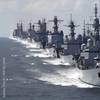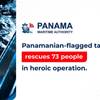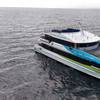Russian-Norwegian Project on Barents Sea
The Barents 2020 cooperation project on safeguarding petroleum activities in the Barents Sea was concluded on Dec. 18 at a conference in Moscow. More than 100 Russian and Norwegian experts have worked together for close to three years on identifying common rules and standards for health, safety and the environment in the Barents Sea. Today they presented their recommendations in front of more than 200 representatives from industry, research institutions and authorities.
The Barents Sea has been subject to industrial activities for years. The extreme climate, however, poses constant hazards to people and operations. And with industrial activities expected to increase in the years to come, there is a need to ensure a strong focus on implementing adequate standards for health, safety and the environment. This is what prompted Norwegian Minister of Foreign Affairs Jonas Gahr Støre to initiate a Russia-Norway cooperation project aimed at safeguarding petroleum activities in the Barents Sea in 2007. The project is a part of Barents 2020, a central element of the Norwegian Government’s strategy on the High North.
DNV has been in charge of coordinating the project on Norwegian side while Gazprom and VNIIGAZ have been central actors on the Russian side. In addition to receiving funding from Norwegian and Russian authorities, a substantial part of the financial contributions have come from the industry itself. “I am confident that its public-private nature has been one of the success factors of this project. Both authorities and the industry realize the need to enforce and implement adequate rules and standards in order to safeguard petroleum activities in the Barents Sea in the years to come. And we all realize our obligation in making this happen,” says CEO and President of DNV Henrik O. Madsen.
The harmonization project has over the past three years brought together two sets of unique experiences; Russian in-depth knowledge and expertise with regard to operations in cold climate and Norwegian expertise from offshore operations.
Among other things the experts gave recommendations on how existing standards may be applied for oil and gas operations in the Barents Sea. The experts also recommended standards for the design of stationary offshore units against ice loads in the Barents Sea, and standards for risk management of major hazards such as fires, explosions and blow-outs on offshore drilling, production and storage units in the Barents Sea.













